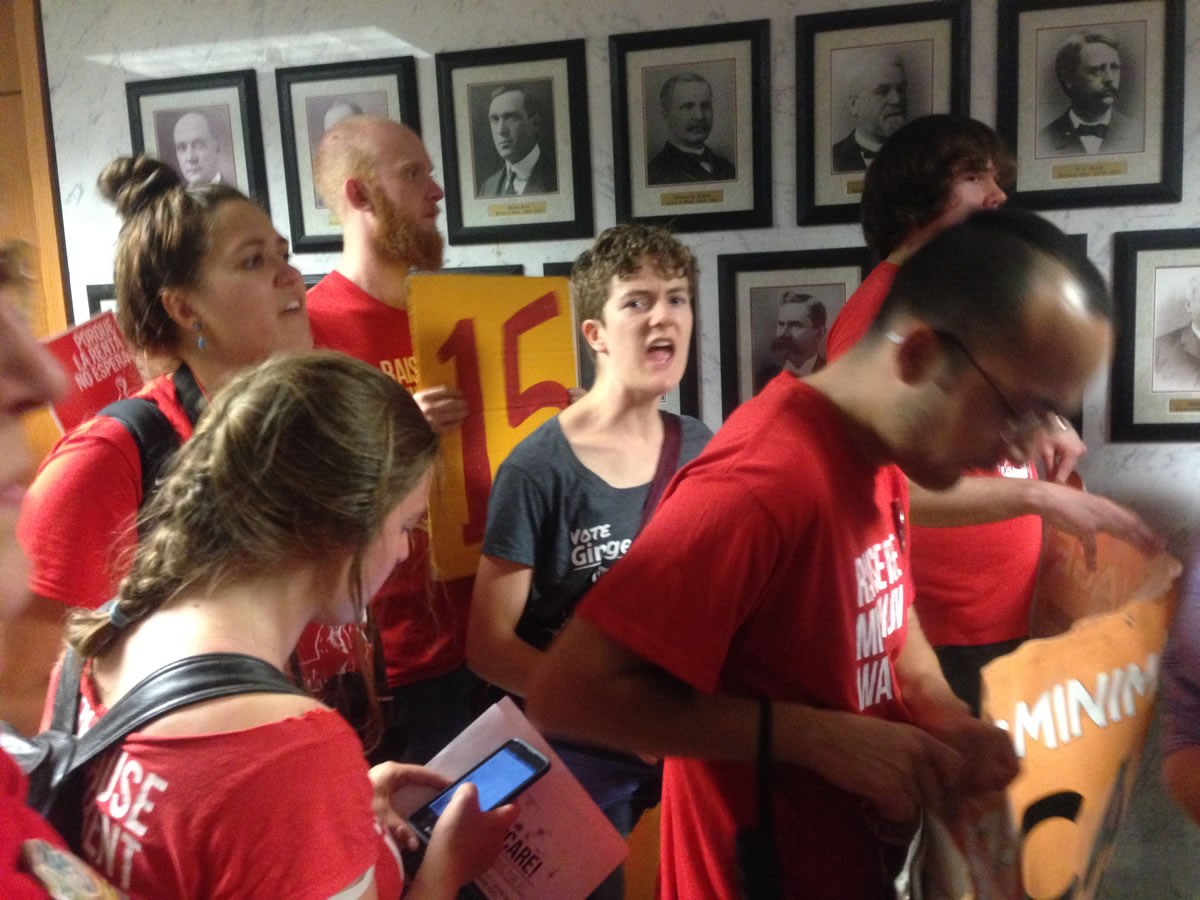

Share
A four-year grassroots campaign to enact a $15 per hour minimum wage in the city of Minneapolis is approaching a dramatic conclusion.
Labor and community groups backing the $15 wage proposal packed a Minneapolis City Council hearing June 22. Next up: The City Council’s Committee of the Whole is scheduled to meet Wednesday, June 28, at 9 a.m. to consider any final amendments.
The Council’s final vote on the $15 minimum wage proposal is scheduled for Friday, June 30, at 9 a.m.
“I feel like we have a really strong groundswell of support for raising the wage,” said Elizabeth Glidden, Ward 8 City Council Member and the measure’s chief author. Still, fearing a last-minute full-court press against the $15 wage from the business community, the Minneapolis Regional Labor Federation and allied community groups urge supporters to come to city hall for both the June 28 and June 30 City Council meetings.
“You never know what can happen,” said Chelsie Glaubitz Gabiou, president of the MRLF.
Along with allied groups, the MRLF has maintained support for “one fair wage for all workers. The business community — and in particular the restaurant industry — has sought to exempt tipped workers from the proposed $15 minimum wage. (Some small businesses and restaurant owners, however, have been vocal supporters of the $15 wage campaign).
“This City Council appears united that the wage should reach $15 and it should be one fair wage that follows the state model,” Glidden said.
Interviewed June 16, Glidden said the current wage proposal would phase-in all employees to $15 per hour within five years.
The phase-in would be weighted so that a more rapid timetable would apply to larger employers while smaller employers — l00 or fewer employees — would get more time to reach $15.
Glidden said the City Council may be open to amending the phase-in schedule but she expressed confidence that the $15 wage will pass. “There might be some changes to the ordinance but the major structural pieces will stay,” she said. “I feel like we’re really close.”
A long-running grassroots campaign
The campaign for the $15 minimum wage — which seemed far-fetched even to some supporters at the outset —grew to achieve broad support in Minneapolis over the past several years.
Significantly, low-wage workers who stood the most to gain became the spokespeople addressing rallies, lobbying elected leaders, and telling their stories to the media — and also going on strike to demand “$15 and a union.”
“I might not know a lot about government,” fast food worker Steven Suffridge said last year, “but I do understand one thing — we deserve the money.”
Workers like Suffridge described the challenges of trying to survive on low-wage, part-time jobs. Many reported needing to coordinate a schedule of two or more part-time jobs, still struggling to make ends meet.
At a time of increasing economic inequities, particularly for people of color, the $15 minimum wage became a clear benchmark for progress towards a greater degree of economic justice.
Workers at the Minneapolis-St. Paul airport organized and won a $15 minimum wage standard from the Metropolitan Airport Commission for service jobs at the airport.
AFSCME members working for Hennepin County won a contract moving all county workers to a $15 minimum wage.
Janitorial members of SEIU Local 26 won a $15 minimum wage in their contracts with cleaning contractors.
Last August, the Minnesota AFL-CIO state convention endorsed the campaign for a $15 minimum wage in Minneapolis and this year vigorously and successfully opposed “preemption” bills at the state legislature which would have blocked cities from passing their own minimum wage laws.
The campaign for $15 has not been without setbacks, however. Last year, in the face of slow-moving progress at the Minneapolis City Council, community groups began a petition drive to put a $15 minimum wage proposal on the November 2016 ballot as a city charter amendment. The City Council voted 10-2 against putting the measure on the ballot. Community groups appealed to the Minnesota Supreme Court — and lost.
The petition drive wasn’t in vain. It revealed broad local support for the $15 minimum wage, which also was confirmed in a public opinion poll.
Since the local drive for $15 began, “we’ve had many cities… get to $15 all over the country,” Glidden noted.
A $15 minimum wage also won support as a national policy goal for the Democratic Party.
“In Minneapolis, the work that enabled us to get to this point has all been done by grassroots leaders, community groups, and labor,” Glidden said.
That movement also helped to win City Council approval last year for a policy mandating employers provide paid sick time — a policy which goes into effect July 1 of this year.
The call for “$15 and a union” continues to inspire, most recently among workers organizing with UFCW Local 653 at Seward Co-op.
Glidden — who is not running for re-election this year — also noted that the 2017 election year has allowed advocates for the $15 minimum wage to make their cause a major issue in this year’s races for Minneapolis City Council and Mayor.
In addition, she said, the aftermath of the 2016 presidential race has prompted a wave of grassroots political activism.
And so, building to the June 30 City Council vote, Glidden said the $15 minimum wage became, “in Minneapolis, an issue that really resonated with the public.”That support has translated into what Glidden called “remarkable agreement by Council members.”
“We’re super excited we’re at this point,” the MRLF’s Chelsie Glaubitz Gabiou said.
The website for Neighborhoods Organizing for Change commented to supporters: “It’s a historic month for the Fight for $15 in Minneapolis! Thanks for everything you’ve done to get us here — now, let’s take it over the finish line together.”

